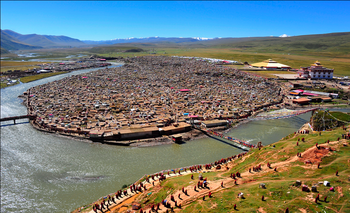Yachen Gar: Difference between revisions
Yeshedorje (talk | contribs) mNo edit summary |
No edit summary |
||
| Line 1: | Line 1: | ||
[[Image:Yachen Gar.png|thumb|350px|Yachen Gar, courtesy of Reurinkjan]] | [[Image:Yachen Gar.png|thumb|350px|Yachen Gar, courtesy of Reurinkjan]] | ||
'''Yachen Gar''' ([[Wyl.]] ''ya chen sgar''), also known as '''Yachen Orgyen Samten Chöling''' (''ya chan o rgyan bsam gtan chos gling''), was founded by [[Akhyuk Rinpoche]] in the summer of 1980.<ref>Terrone (2009) p.91</ref> | '''Yachen Gar''' ([[Wyl.]] ''ya chen sgar''), also known as '''Yachen Orgyen Samten Chöling''' (Wyl. ''ya chan o rgyan bsam gtan chos gling''), was founded by [[Akhyuk Rinpoche]] in the summer of 1980.<ref>Terrone (2009) p.91</ref> | ||
It is located in an isolated valley | It is located in an isolated valley 4,000m above sea level, where the river Dzin Chu flows through, in Pelyül (Ch. Baiyu) County, Kandze T.A.P (Ch. Ganzi). | ||
During the 1990s, the population of monks and nuns grew to over 7,000. The authorities deemed the encampment of huts and tents to be problematic, and in 2001 they ordered the demolition of large parts of Yachen Gar. Akhyuk Rinpoche remained there during the demolitions and continued to teach. The monastic community survived, and in recent years a new nunnery was constructed. With more than 10,000 Sangha members now, it is one of the largest | During the 1990s, the population of monks and nuns grew to over 7,000. The authorities deemed the encampment of huts and tents to be problematic, and in 2001 they ordered the demolition of large parts of Yachen Gar. Akhyuk Rinpoche remained there during the demolitions and continued to teach. The monastic community survived, and in recent years a new nunnery was constructed. With more than 10,000 [[Sangha]] members now, it is one of the largest gatherings of nuns and monks in the world. Most of the Sangha are nuns. | ||
==Notes== | ==Notes== | ||
| Line 10: | Line 10: | ||
==Further Reading== | ==Further Reading== | ||
*Terrone, Antonio | *Terrone, Antonio, 'Householders and Monks: A Study of Treasure Revealers and their Role in Religious Revival in Contemporary Eastern Tibet' in Sarah Jacoby and Antonio Terrone, ''Buddhism Beyond the Monastery: Tantric Practices and their Performers in Tibet and the Himalayas'', Brill, 2009. | ||
[[Category:Dharma Encampments]] | [[Category:Dharma Encampments]] | ||
[[Category:Tibet]] | [[Category:Tibet]] | ||
Revision as of 11:31, 31 May 2014

Yachen Gar (Wyl. ya chen sgar), also known as Yachen Orgyen Samten Chöling (Wyl. ya chan o rgyan bsam gtan chos gling), was founded by Akhyuk Rinpoche in the summer of 1980.[1]
It is located in an isolated valley 4,000m above sea level, where the river Dzin Chu flows through, in Pelyül (Ch. Baiyu) County, Kandze T.A.P (Ch. Ganzi).
During the 1990s, the population of monks and nuns grew to over 7,000. The authorities deemed the encampment of huts and tents to be problematic, and in 2001 they ordered the demolition of large parts of Yachen Gar. Akhyuk Rinpoche remained there during the demolitions and continued to teach. The monastic community survived, and in recent years a new nunnery was constructed. With more than 10,000 Sangha members now, it is one of the largest gatherings of nuns and monks in the world. Most of the Sangha are nuns.
Notes
- ↑ Terrone (2009) p.91
Further Reading
- Terrone, Antonio, 'Householders and Monks: A Study of Treasure Revealers and their Role in Religious Revival in Contemporary Eastern Tibet' in Sarah Jacoby and Antonio Terrone, Buddhism Beyond the Monastery: Tantric Practices and their Performers in Tibet and the Himalayas, Brill, 2009.